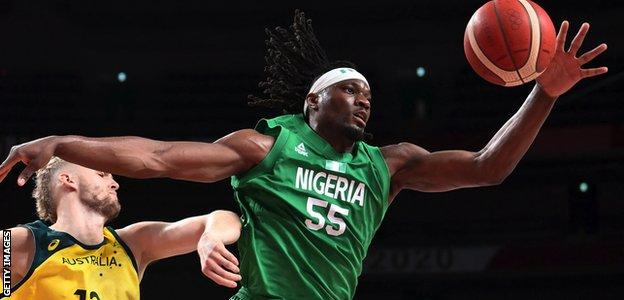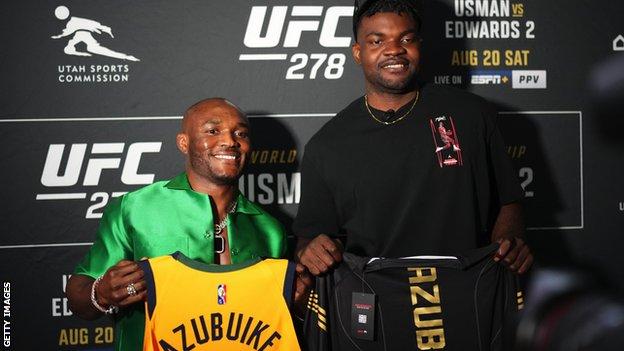
Basketball can overcome off-court problems that have “plagued” the game to supplant football as the number one sport in Nigeria, according to the vice president of NBA Africa.
The West African country withdraw its teams from international competition in May at the behest of the government, which intended to dissolve the Nigerian Basketball Federation (NBBF) and appoint an interim committee to oversee the management of the game.
That decision was reversed a month later but the change of direction came too late for the women’s national team, who lost their place at the World Cup in Australia, which begins next month.
However, the men’s side are still competing for qualification for next summer’s World Cup.
“Yes, there was a ban, but the ban has been lifted. And the great thing is that all the stakeholders who are invested in the growth of basketball are focused on moving the game forward,” Gbemisola Abudu, who also holds the position of Head of NBA Nigeria, told the BBC World Service.
“The number one team sport played by most Nigerians, and that most Nigerians engage with, is football – the second being basketball.
“There’s an appetite for the sport in the market – and this is without us doing some level of intentional investments.
“You can only imagine that with us (the NBA) opening an office, with the type of programmes we’re going to have from our junior NBA programmes to our coaching programmes, it’s only going to increase the footprint of the brand and of the game in Nigeria.”
Nigeria presents ‘incredible opportunity’ for NBA
The initial move to dissolve the NBBF and withdraw from international competition for two years was made by the Ministry of Youth and Sports, approved by President Muhammadu Buhari.
A statement from the ministry cited “the unending drama that plagued and nearly crippled basketball” as a reason for its decision.
Struggling with a crippled domestic league following a protracted leadership crisis, several overseas-born players and a strong community of diaspora players based in the United States have been persuaded to play for Nigeria’s men’s and women’s teams.
This has led to success at the African Basketball Championships in recent years – with the men winning in 2015 and three straight triumphs for the women’s team.


NBA Africa opened an office in Nigeria in February, and Abudu believes Africa’s most populous nation provides a perfect platform and talent base to grow the game on the continent.
“Nigeria presents an incredible opportunity for the NBA,” Abudu continued. “More than half of the players in the NBA of African heritage are Nigerians.
“The NBA is in the business of increasing the footprint of basketball and our goal is to make sure that young boys and girls are able to play basketball.
“We’re so focused on doing what the NBA does, whether it’s from teaching fundamentals, having more people play and benefit from the life skills basketball teaches, to our ability to influence whatever ecosystem we’re in.
“Social justice is a big part of our DNA, making sure that we’re making an impact in a community. That’s what we’re focused on and I truly believe that in the long run it will have an impact.”
North America’s NBA remains the pinnacle of the domestic game, but has established itself in Africa with the long-running Basketball Without Borders camp and the Basketball Africa League (BAL), which had its second season this year.
Abudu, who was born in Nigeria but raised in the United States, studied in California, where she fell in love with basketball.
It also gave her an insight into the impact sport can have in a wider context.
“What I really love about this position is it really brings all my interests under one umbrella,” she said.
“And I get to do that with our junior NBA programme, which really is a programme that truly is positioned to be used as a tool for nation building, because you’re impacting the youth in Nigeria.
“When you look at our population of 211 million people, the average age in Nigeria is 18.9 years old, so you have a programme that speaks to them and caters to them.”
Entering ‘the subconscious of culture’


Abudu, an entrepreneur and global marketing expert, says success in her role will be attained when basketball “becomes second nature” in Nigeria.
“It [success] is when it’s something kids look forward to because it’s become part of the school curriculum,” she added.
“That’s success for me; where your average kid has the opportunity to play basketball, when you start hearing kids say ‘I want to grow up to be a basketball player’, ‘I want to play in the BAL’ or ‘I want to play in the NBA’.
“That’s success – because that means you’re becoming part of the subconscious of culture in Nigeria – and it’s when more people are watching our primetime games on Saturday.
“Also, I would say our junior NBA programme to be implemented in the six geopolitical zones of Nigeria. I want us to have a junior NBA programme in all the different regions where kids who love basketball can plug themselves into our programme. To me that’s success.” (BBC)


